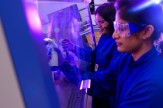NSF grant supports global nanomedicine program
Northeastern University has received a five-year, $3.1 million grant from the National Science Foundation to build on the success of its innovative Integrative Graduate Education and Research Traineeship (IGERT) nanomedicine program through the development of new global research and educational partnerships.
The new partners include Harvard Medical School, the University of Puerto Rico at Mayaguez, Tuskegee University and universities in Naples, Italy; Sao Paulo, Brazil, York, England; and Delhi.
The program will offer highly competitive fellowships to outstanding doctoral students in science, technology, and mathematics disciplines for research training in nanomedicine.
IGERT fellows from Northeastern and partner universities will have the opportunity to conduct research at Northeastern and Harvard-affiliated hospitals during their fellowship.
Srinivas Sridhar, director of Northeastern’s IGERT nanomedicine program, noted that the National Science Foundation (NSF) funds fewer than 5 percent of IGERT program proposals. “The new award is an endorsement of the current nanomedicine program, as well as the vision presented in the new proposal,” he said.
Sridhar, a professor of physics at Northeastern, added that “nanomedicine is an emerging field and in this program the fellows will learn how to translate fundamental knowledge in nanoscience and nanotechnology into medical treatments that have the potential to save lives.”
Fellows will help develop new nanotechnology-based approaches to deliver drugs for treating cancer, cardiovascular disease, and other illnesses. Fellows can also participate in internships working with scientists in research hospitals, government laboratories and industry.
When Northeastern’s first IGERT program in nanomedicine was established in 2005, it included the world’s first PhD program in nanomedicine. The new NSF grant will support the development a new standalone PhD program open to non-IGERT students as well as fellows.
Nanomedicine research and education spans seven departments at Northeastern, including biology, chemistry, physics, chemical engineering, mechanical and industrial engineering, electrical and computer engineering and pharmaceutical sciences.
The new program will be under the direction of Sridhar, Mansoor Amiji, professor and chair of the department of pharmaceutical sciences, and Laura Lewis, chair of the department of chemical engineering.





